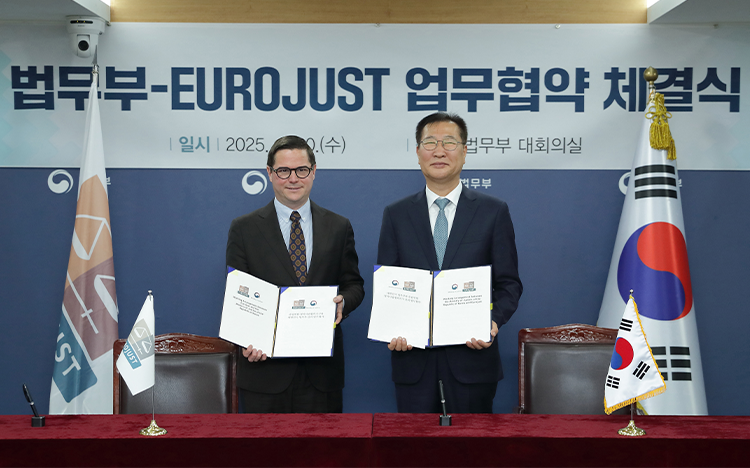
Eurojust President Mr Michael Schmid and Minister of Justice of the Republic of Korea Mr Park Sung-jae signed a Working Arrangement today in Seoul to enable long-term cooperation in the fight against serious and organised crime. The arrangement provides for strategic collaboration and the exchange of information between the Agency and the authorities of the Republic of Korea. It is the ninth country outside the European Union, which has signed such an arrangement with Eurojust and the first Asian country.
Eurojust President Mr Michael Schmid said: Organised crime is becoming increasingly sophisticated and international, operating seamlessly across both physical and digital borders. To meet this challenge, prosecutors from different countries and continents need to unite and devise strategies for closer cooperation. It is not enough to temporarily disrupt criminal networks. We need to hold these criminals accountable in court. That is why I am proud to sign this Working Arrangement with our South Korean counterparts today, laying the foundation for deeper cooperation and more impactful joint casework.
Close inter-state cooperation is essential to root out transnational crimes such as money laundering, drug trafficking and cybercrimes, including online sexual abuse and hacking,
said Minister of Justice of the Republic of Korea Mr. Park Sung-jae in his remark. Through the Working Arrangement signed today, we are making a step forward to reinforce criminal justice cooperation between the Republic of Korea and the European Union.
As organised crime is expanding on a global scale, judicial cooperation across borders on a worldwide level is of paramount importance for the European Union. The signing of Working Arrangements with partner countries is in line with the EU Strategy to Tackle Organised Crime, supporting judicial authorities in the EU to have effective and reliable cooperation with national authorities outside the Union.
Working Arrangements facilitate the exchange of best practice and provide for more direct and straightforward contact with judicial authorities outside the EU. They can also assist with the access of partner countries’ authorities to Eurojust’s operational cooperation tools in investigations involving at least one EU Member State.
A Working Arrangement is no basis for the exchange of operational personal data, but formalises the role of the Eurojust Contact Point, with the aim of ensuring the more rapid execution of requests for judicial cooperation on both sides. As of November 2023, Eurojust has signed cooperation agreements with Bolivia, Chile, Costa Rica, Egypt, Ecuador, Nigeria, Panama and Peru, as well as the Ibero-American Association of Public Prosecutors Offices (AIAMP).
More information on Eurojust’s international cooperation can be found in the FAQ on the Working Arrangement with South Korea.